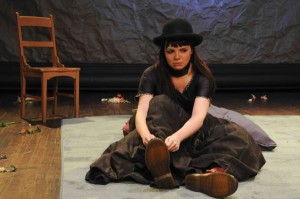The Seagull | Siren Theatre Company
- June 15th, 2010
- Posted in Uncategorized
- Write comment

The more theatre I see- the more plays I read- the more I feel the groaning weight of history, of scholarship, of stories, of “words, words, words,” that I don’t know- haven’t seen productions of. I have limited experience of Chekhov- having only read The Seagull, Three Sisters and The Cherry Orchard… lucky for me Uncle Vanya will be making his way onto stage at The Sydney Theatre Company in November this year- saving me an afternoon hunched over a yellowing and somewhat brittle penguin edition. But largely my relationship with Chekov has been theoretical- and not practical. I didn’t see Cate Blanchette as Nina in 1997… I dd not see the original Russian production nearly 100 years earlier in Russia. I have however had the opportunity to see Siren Theatre company’s The Seagull at Sidetrack Theatre this month.
The value of classics- are they hold within them a set of questions or timeless universal questions (note that I have no said “universal truths”- I believe that plays are largely in the business of raising and provoking questions more than “solving problems” of any grand or universal nature.) for the audience to engage with. Classics comfort us. Providing us with critical distance (through temporal and geographical) so we may extend our compassion large distances and so we may to examine our opinions, reactions, feelings, experiences in a psychologically safe way. Classics are valuable in what they remind us about enduring human perspective- the sameness of our struggle and yearning. And yet, for me there is a sadness in this reassurance- after years and years – nothing has changed- we are stuck in the same patterns, of failure and selfishness, we are burdened by guilt and pride- duty and love. It is the classics which inform where we are artistically now- and are an essential part of any healthy theatre diet.
There is a guarantee with Kate Gaul’s work- that it will be a polished and professional piece of work. A director with more runs on the board than any other woman of her generation, a passionate advocate for emerging theatre artists- a tireless jobbing director- Gaul has already had a busy year… and it is not over yet. Gaul carries with her a gravitas that draws close some of the most respected and remarkable artists of the independent and mainstream theatre. Her work is always handsome. Always finessed. Always clear and confident.
The Seagull, first produced in 1896, concerns the passions and struggles of four artists of two generations- two actors, two writers- as they search for art, fame, recognition and innovation. Trapped in a pastoral setting- the imaginations and egos run rampant- and hypothesis are offered about the meaning of the experience of being an artist. Interwoven throughout these philosophical explorations, love shows itself to be a frustrating and necessary motivator for everyone within the play- no one is quite able to grasp what/who they want or need. The yearning is an exquisite and inspiring agony.
A large picture frame hangs down stage. A large sheet of crushed brown paper hangs up stage- light gauze curtains reveal and conceal scenes. Though the opening image reminiscent of Armfield’s production of Marriage of Figaro (Mozart’s Opera 2008 and the Geoffrey Rush adaptation at The Playhouse in 2000) this production is handsomely designed by Andy McDonell. Lighting by Luiz Pampolha is sophisticated and elegant. There is much space given to the mise en scene- lighting a plethora of dinner candles- and snuffing them out- the destruction of Konstantin’s papers- the creation of the garden scene strewn with flowers and cushions… the decor arranged- it is worth the wait.
The Seagull is, largely a show for artists. It is about the struggles and sweet minor successes of the arts. A comment on satisfaction – a comment on ambition- fate/choice as the naieve Nina launches into the brave unknown her eyes ablaze with ambition and joy. With an accomplished cast including Zoe Carides (Irina) Matt Edgerton (Trigorin), Robert Alexander (Dorn) and Katherine Cullen (Masha), Genieve Mooy (Polina)- this is a show definitely worth the ticket price- the performances are generous, intelligent and take big risks- especially in atown (and theatre community) brimming with actors who have experienced a good practical dose of Chekhov at their respective drama schools… and all those who have a favourite/opinion on “how” Chekhov is to be “done.”
Gaul’s production is smartly constructed, impressive and taut. It is unsentimental- straight forward and clear- whilst maintaining its elegance and the charm of self-referential flattery.
Hi Augusta – this sounds like a rather lovely production. I quibble though with the idea that classics – whatever they are – are “comforting”. I think art endures because it remains discomforting!
Indeed Alison, I think what I meant- it is comforting that art endures. That the discomfort we feel is timeless- is comforting and links us to a rich history of great thinkers and writers.